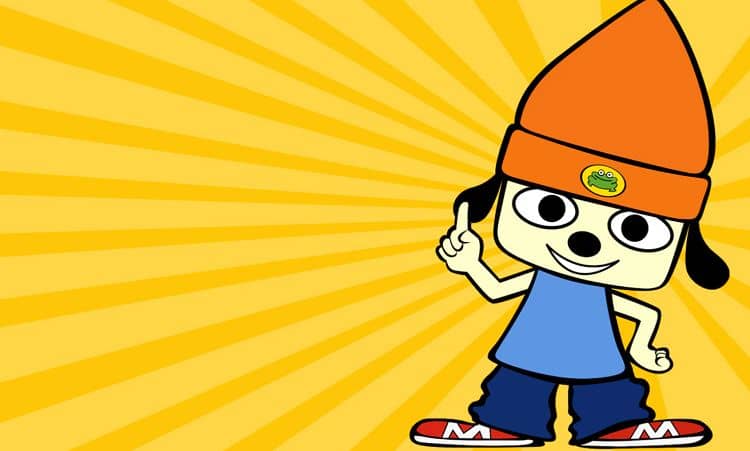
Parappa the Rapper was one of my most meaningful gaming experiences of all time, and I never owned it in its native form. Back in the days where game systems were game systems and not entertainment hubs disguised as game systems, my Playstation came with a demo disc. From a bizarre Die Hard game that let you play as the terrorists, too, to Broken Sword and other classics that now look clunky and obsolete, it was one of my earliest experiences in 3D gaming. Most of these demos were forgettable, but then there was Parappa the Rapper. Millennials have a funny overview of video game history. Coming into childhood when the Super Nintendo was all the rage but NES was still the modern-day equivalent of the PS4, we missed the clunky days of Intellivision but saw the graphical evolution, nonetheless. Now, the games we played at seven or eight still hold up thanks to their visual limits making their stylistic choices read more like an art movement and less like a reaction to the limited technology they had to work with.
There’s a reason why Resident Evil and Tony Hawk’s exceptional remasters were, essentially, new games based on the original concept. Playing games from the first two generations of true-blue three-dimensional environments is often a painful experience. The controls seem dated, and even when the graphics get a boost, those that keep the original gameplay are clunky, frustrating, and at times hilarious. The groundbreaking tech that made them such a step up on the competition in 1996 is now what makes them age like milk while even mediocre Super Nintendo games hold up. Parappa takes a similar, albeit less overt approach to Tony Hawkand Resident Evil in bringing beloved games to a 21st-century audience. The purposeful cardboard cutout graphics combined with catchy songs, simple yet challenging controls, and funny narrative that barely makes sense to the actual gameplay are very much the same, albeit more polished. The game is less an update on the 1997 classic and more the 1997 classic if they had 21st-century tech.
The game’s creator, Shuhei Yoshida, even spoke about his desire not to rebuild it from the ground up, but to preserve it by keeping everything about the original intact. “Due to the rapid progress in computer technology, we often feel let down at the poor visual quality of our old favorite games when we play them after a long time. However, the PS4 version of Parappa still gives us the same impact as when we first played it on the original PlayStation. I felt as if the image of PaRappa that I had in my mind came back to life on the PS4,” He told Playstation.com when asked about the remaster in 2017. Parappa the Rapper’s simplicity kept its gameplay on the cutting edge. In some ways, the mechanics are more in tune Quantum Realm’s interactive movie games than Guitar Hero, Rock Band, or its contemporary, Dance Dance Revolution. Yes, it’s an archaic version, but ones ability to stay on top of things without messing up mean its less about amassing lives and more about making the right decisions while staying on your toes. There may not be a guitar or dance pad guiding your movements, but the low stakes of Parappa the Rapper doesn’t make it any less challenging.
The controls are, at times, frustrating, but not in the clunky way that you imagine. If anything, the game trusts players to adjust to modern controllers with the basics of the 1997 tech. At first, I thought it was a hindrance, but as I played through the game’s story, I realized that it was not a flaw, but a subtle way to bring me back to the expectations gamers my age had in 1997. While many games let the cutscenes cover up its graphical inadequacies, the 2017 remaster keeps the standard definition look before seamlessly blending into HD graphics that look like cleaner versions of the ones we know and love. Parappa the Rapper is one of those funny franchises like Tomba that found great success upon release and spawned sequels and spin-offs, but failed to find the lasting impact that other contemporaries of the era had. Perhaps, this is why it’s still so beloved nearly a quarter-century later. There are not 30 sequels that bleed into different systems. They never tried to bring us half-baked sequels that felt like awful cover versions of the original. Instead, Parappa the Rapper remains a product of its time that both shows its age with pride and feels as fun and fresh today as it did in 1997.
I recently sat down and played through Parappa with an 11-year-old nephew whom I’ve successfully wired to enjoy some of the games of my past. However, while Mario 64 and all the games on my Raspberry Pi have mixed results, Parappa hooked him just like it hooked me. If Parappa ever gets a second sequel, I hope they remember what made the first one so unique. It never tried to reinvent the wheel, nor did it try to cash itself in on recent trends. Instead, Yoshida and his team at NanaOn-Sha gave a 1997 audience a strange game featuring vegetables and anthropamorphic animals who were always just a turntable away from a makeshift rap battle. That was all it needed to be then, and it’s still all it needs to be now.
I may have never owned Parappa, but that demo disk I got with my Playstation came with a level that encapsulated the game. As soon as I hear the opening lines of Master Onion’s “Kick, Punch, it’s all in your mind,” I’m transported to exactly where I was in 1997I’ve played hundreds of games featuring memorable levels, games, and music, but from Master Onion’s bars in the first level to the funky flows at flea markets and the show-stopping positivity of I’ve Got to Believe, Parappa the Rapper lives in my head in a more vivid space than just about any game I ever played. This, above all, is a testament to the power of being weird, meticulous, creative, and visionary without trying to be something that you’re not. It’s not only a lesson that drives the titular character through his rap adventure, but a lesson that new game developers should look at if they want to create another modern masterpiece. Until they do, however, Parappa remains one of the best games of the first Playstation, and it shows no signs of losing that mantle any time soon.PS4
 Follow Us
Follow Us





